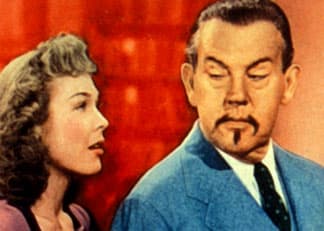Having a Caucasian put on yellow-face to play Chinese is a dubious enough starting point for these '40s era Charlie Chan films. The fact that Sidney Toler, as detective Chan, does such a bad job of it just makes it that much worse. This Chanthology brings together six 105-minute Charlie Chan films from 1944-'45; These are the Monogram Studios Chan pictures made after 20th Century Fox ceased production on the stagnating series. And they are, by most accounts, among the weakest of the series' 47-film run low budget and wildly outdated, there's not much to recommend here. Each of the six stories involves an unlikely murder scenario in which baffled local police defer to Chan's supposed detective genius to solve the case. Mostly Chan just shuffles from room to room at the scene of the crime looking thoughtfully at chairs and at strange markings on walls. When it's time to interrogate a witness, Chan has a huge and boring arsenal of lame Orientalist proverbs, all uttered with the same half-assed pigeon-English (he skips the articles "a" and "the"). Worst of all is the endless monotone that characterises his speech throughout the films, which especially odd considering that Toler was a successful baritone opera singer in his day. The only thing that makes the films tolerable is Mantan Moreland's recurring performances as Birmingham Brown, Chan's half-witted assistant. A prolific character actor famous for playing skittish, bug-eyed fools, Moreland was one of the most gifted black comedic actors of his generation. He's at the top of his game in all six of these films and is given ample opportunity to demonstrate his masterful double-takes, delayed reactions and sharp verbal wit. Whether it's Charlie Chan in the Secret Service, The Chinese Cat, The Jade Mask, Meeting at Midnight, The Scarlet Clue (all directed by Phil Rosen) or The Shanghai Cobra (directed by Phil Karlson), the names are as interchangeable as the plots. An interesting historical document, maybe; it's just a shame they were so poorly crafted. If the reissue of these Charlie Chan films raises questions about racial stereotypes in American cinema, they are not addressed here. (MGM)
The Charlie Chan Chanthology
Phil Rosen and Phil Karlson

BY Ian MackenziePublished Aug 1, 2004



